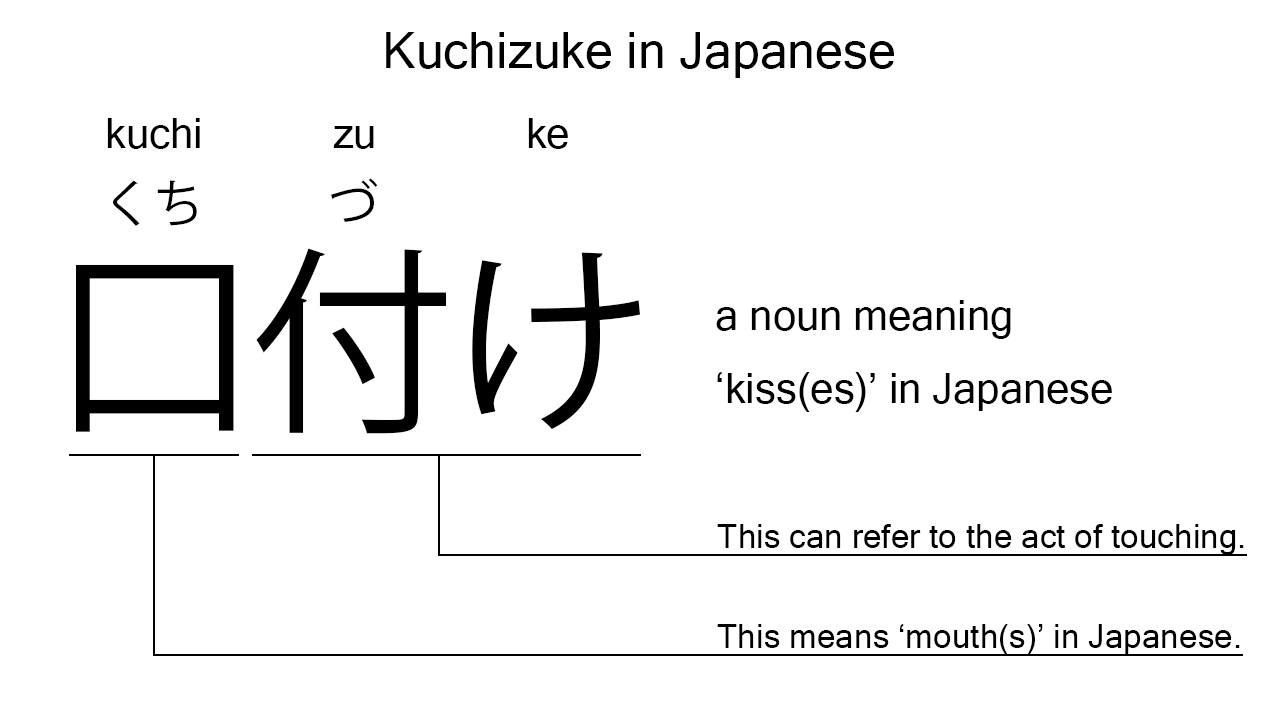How to say “kiss” in Japanese
Honestly, native speakers quite often use the imported word, “kisu”, to mean ‘kiss’ in Japanese. In this blog post, however, I will focus on the Japanese word, “kuchizuke”. I will explain it in detail based on its grammatical components. And also, I will explain how to use it through example sentences. My explanations would help Japanese learners understand “kuchizuke” more clearly. Then, let’s get started!
Contents
Definition and meaning of “kuchizuke”
Let me start with the definition and meaning of “kuchizuke”.
- kuchizuke – 口付け (くちづけ) : a noun meaning ‘kiss’ in Japanese. This can also work as plural. Learn more about Japanese plural.
The definition and meaning are simple and clear. To understand this noun more clearly, however, let me explain its grammatical components in detail, one by one.
What does “kuchizuke” literally mean in Japanese?
“Kuchizuke” consists of the following two components:
- kuchi – 口 (くち) : a noun meaning ‘mouth’ in Japanese.
- zuke – 付け (づけ) : can be considered as the noun form of “tsukeru” which means ‘to touch’, ‘to attach’, ‘to append’, or such in Japanese.
From these two components, we can understand that “kuchizuke” literally means ‘mouth touching’ in Japanese. This literal interpretation is very close to the actual meaning.

When we meet new Japanese words, we should check their grammatical components in detail to understand their meanings clearly and deeply. In many cases, components tell us a lot about the meanings of the words they form. Actually, here, we could get the better understanding of “kuchizuke” through the detailed check above.
So far, I’ve explained the definition and meaning of “kuchizuke” together with its grammatical components. Then, let me explain how to use it through the example sentences below.
Example #1: how to say “kiss” in Japanese
kanojo no kuchizuke wo wasure rare nai – 彼女の口付けを忘れられない (かのじょのくちづけをわすれられない)
I can’t forget her kiss.
Below are the new words used in the example sentence.
- kanojo – 彼女 (かのじょ) : a pronoun meaning ‘she’ in Japanese.
- no – の : a case particle used after a noun or pronoun to make its possessive case. In the example, this is used after “kanojo” to make its possessive case, “kanojo no”, which means ‘her’ in Japanese.
- wo – を : a case particle used to make the object word in a sentence. In the example, this is used after “kanojo no kuchizuke” to make the object in the sentence.
- wasure – 忘れ (わすれ) : one conjugation of the verb, “wasureru“, which means ‘to forget’ in Japanese. In the example, it has been conjugated for the better connection with its following word.
- rare – られ : one conjugation of the auxiliary verb, “rareru”, which is used after a verb to make its potential form. In the example, this is used after “wasure” to add the meaning of ‘can’.
- nai – ない : an auxiliary verb used after a verb, adjective, or auxiliary verb to deny its meaning. In the example, this is used after “wasure rare” to deny its meaning.
This is a typical usage of “kuchizuke”. In the example, it works together with the possessive case, “kanojo no”, to mean ‘her kiss’ in Japanese.
Example #2: another usage of “kichizuke”
kuchizuke wa horonigakat ta – 口付けはほろ苦かった (くちづけはほろにがかった)
The kiss tasted bittersweet.
Below are the new words used in the example sentence.
- wa – は : a binding particle working as a case marker or topic marker. In the example, this works after “kuchizuke” to make the subject in the sentence.
- horonigakat – ほろ苦かっ (ほろにがかっ) : one conjugation of the i-adjective, “horonigai”, which means ‘bittersweet’ in Japanese. In the example, it has been conjugated for the better connection with its following word.
- ta – た : an auxiliary verb used after a verb, adjective, or auxiliary verb to make its past tense form. Probably, this is well known as a part of Japanese ta form. In the example, this is used after “horonigakat” to make its past tense form, “horonigakat ta”.
This is another typical usage of “kuchizuke”. In this example, it works together with the binding particle, “wa”, to become the subject in the sentence. Anyway, when we want to mean a ‘kiss’ in Japanese, this noun is a good option.
Summary
In this blog post, I’ve explained the definition and meaning of “kuchizuke” in detail based on its grammatical components. And also, I’ve explained how to use it through the example sentences. Let me summarize them as follows.
- kuchizuke – 口付け (くちづけ) : a noun meaning ‘kiss’ in Japanese. This can also work as plural. Grammatically, this consists of two parts, “kuchi” and “zuke”, which literally mean ‘mouth touching’ in Japanese. This literal interpretation is very close to the actual meaning.
Hope my explanations are understandable and helpful for Japanese learners.